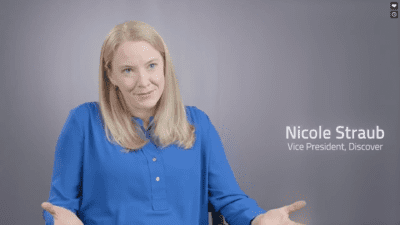Student loans — private or federal — are a common part of the equation for many college payment plans.
But just because they’re common doesn’t mean they’re easy to navigate. From filling out your Free Application for Federal Student Aid (FAFSA®) to paying back your student loans after graduation, there are a lot of steps, a lot of numbers and a lot of choices to make that can affect your financial future. Here’s valuable feedback from students about what they wish they’d understood before taking out student loans.
1. Don’t Borrow More Than You Need
As a student, Rosemarie Bennett commuted to Montclair State University. Because she lived at home, paid in-state tuition and received help from her parents, she didn’t need much in the way of student loans. Still, she borrowed thousands of dollars because she didn’t fully understand the meaning of a student loan. She thought it was free money instead of borrowed money and didn’t consider how she would repay it. “Now 10 years later,” she says, “I’m close to paying most of it back,” but she wishes she hadn’t taken out as much money as she did. So before you accept the federal loans in your award letter or apply for a private student loan, take a close look at your anticipated expenses and only borrow what you really need.
2. Mind the Details, No Matter How Small
Amanda Rae has tried to be diligent about repaying her private student loans since graduating from Kent State University, but she has had a few small slip-ups. At least, they were small in her mind. But to her student loan lender, a missed payment is a missed payment, regardless of how small it is or how quickly the problem gets resolved. One time, Rae was a few days late on her payment and didn’t think much about it. Her lender resorted to calling her cosigner before Rae made good on the payment, which created an uncomfortable situation for Rae. She advises anyone who takes out a student loan to know what’s due and when — and if you are going to be late or can’t make a payment, call the lender to discuss your options well before the due date.
3. Know the Requirements for Loan Forgiveness
There are programs unique to federal student loans that will forgive your student loan balance after you’ve made a certain number of payments. One of these forgiveness programs is the federal Public Service Loan Forgiveness (PSLF). Through PSLF, you may be able to get your student loans forgiven if: 1) you work full-time for the government at any level or for certain not-for-profit organizations; and 2) make 120 qualifying payments during your time of employment. “I wish I knew how the Public Service Loan Forgiveness program actually worked,” says Pat Williams, a West Chester University graduate, since he served in the military, which is a qualifying form of public service. At the time he borrowed federal student loans, he signed up for an Extended Repayment Plan, which wasn’t eligible for PSLF, so he inadvertently disqualified his student loans for forgiveness. Today, however, it is possible for borrowers who opted for an Extended Repayment Plan to qualify for PSLF. Still, if you’re planning to take advantage of loan forgiveness, research all the terms and recent changes so you remain eligible.
4. Apply for Loan Forgiveness and Deferment
In addition to his loan type, Williams also missed out on student loan forgiveness because he thought “if I just didn’t pay my loans, they’d be forgiven.” Unfortunately, that’s not the case. While student loan forgiveness, deferment and forbearance are valuable features of federal student loans, you must specifically apply for these forms of relief and meet certain requirements to qualify. The same goes for private student loan deferment and forbearance programs, and requirements vary by lender. Williams never applied, even though he may have been eligible for assistance as he spent time on active military duty. Instead, he skipped payments for eight straight years. It wasn’t until his wife noticed a stack of unopened mail that turned out to be years’ worth of bills that he realized there was a problem. His unpaid loans had accrued enough interest and penalties to grow the loan amount from an initial $26,000 to $35,000.
5. Beware of Predatory Consolidation Services
In an attempt to consolidate her private student loans, Alyssa Saunders Molfese signed up for a service that seemed like an amazing deal. In hindsight, she realizes the deal was too good to be true. While there are credible student loan consolidation services, Saunders Molfese didn’t research the company she used and wound up paying them an extra $1,000 in fees — on top of what she owed for her private student loans — after the company had guaranteed to save her money. Fortunately, she was eventually able to get out of the contract with the predatory consolidation company. Still, she wishes she could have put that $1,000 toward her student loan repayment instead.
6. Factor in Future Salary and Job Search When Borrowing
April Kozlowski Palomino borrowed to attend San Antonio College, assuming she’d get a high-paying job right out of college that would allow her to repay her student loans. Only that didn’t turn out to be the case. “I thought it’d be so much easier to get a job when I graduated, but I didn’t find work for a few years, which made repaying my loans hard,” she says. Palomino wound up defaulting because she fell behind on her payments.
As you consider borrowing, research the salaries available in your field so you know what you can afford to pay back. Be sure you have a backup plan, like some savings, if a job search takes longer than anticipated. If your financial situation after graduation isn’t quite what you hoped it would be, and your loan payments aren’t manageable, you might consider changing your repayment plan on federal loans or talking to your lender to see what options are available for private loans.
7. Understand the Consequences of Default
If students fail to repay their loans, they could go into default, which carries additional consequences. Williams defaulted on his student loans, which impacted his credit, and he wasn’t able to get approved for any credit cards for years. Because he owed money to the government on his federal student loans, the government was able to garnish his federal tax refunds to recoup what he owed. Defaulting on federal or private loans can also lead to wage garnishments.
Due to her extended unemployment, Kozlowski Palomino went into default on her student loans. She had just started working as a nurse when she defaulted. She’d missed so many payments that she wasn’t able to catch up, even with a job, and her career was adversely impacted. “I didn’t realize they would place a hold on your license, keeping you from being able to work in your profession, when you fell into default,” she says. This isn’t just an issue for nurses or professions that require licensing. In general, employers can look at your credit and may use that information to make personnel or hiring decisions. If you default on your federal or private student loans, it certainly affects your credit, but it can also impact your paychecks and your career.
These students’ missteps with their student loans serve as important reminders that it’s easy to get off-track when borrowing for college if you don’t fully understand what you’re signing up for.
Students should maximize scholarships, grants, and other free financial aid before taking student loans. For students who need to borrow, we advise them to compare federal and private student loans to find the loans that best fit their needs.
Interviews for this article were conducted in 2018.
FAFSA® is a registered trademark of the US Department of Education and is not affiliated with Discover® Student Loans.





